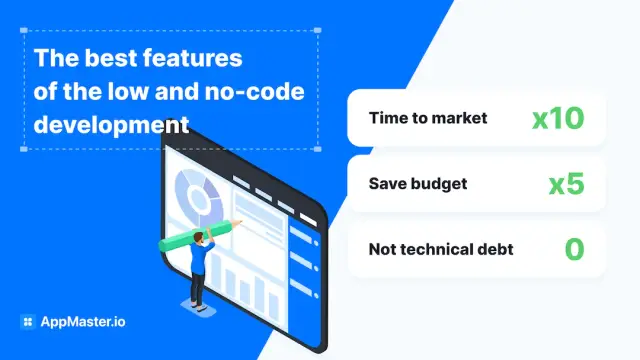Why Rapid App Development is Essential in the Post-Pandemic World
Explore how Rapid Application Development (RAD) has become an essential strategy in the post-pandemic business world, featuring case studies, benefits, and ways to adopt RAD leveraging AppMaster's no-code platform.

Shift in Business Priorities Due to the Pandemic
The COVID-19 pandemic had a profound impact on businesses worldwide, forcing them to adapt to rapidly changing market conditions, consumer behaviors, and technological advancements. As traditional operations came under threat, organizations began to reshape their strategies and prioritize digitization to survive and eventually thrive in the post-pandemic market.
One of the most significant changes brought on by the pandemic was the accelerated adoption of remote work. With lockdown measures in place, companies needed to ensure that their employees could work efficiently from home, increasing the demand for digital solutions that facilitate collaboration, communication, and project management.
Furthermore, businesses across various industries, including healthcare, education, retail, and finance, had to pivot quickly to adjust to evolving customer needs. This could mean launching new services, revamping existing products, or even venturing into entirely new business models.
In response to these challenges, the software development industry has experienced increased demand for rapid application deployment, as organizations seek to create and launch digital solutions that cater to emerging needs in the post-pandemic world. This necessity has highlighted the critical importance of Rapid Application Development (RAD) methodologies that enable businesses to build and launch software applications quickly and efficiently.
Rapid Application Development (RAD) as a Solution
Rapid Application Development (RAD) is an agile software development methodology that prioritizes rapid prototyping, iterative development, and efficient collaboration between developers and users. This approach enables businesses to quickly create functional applications and respond to changing market conditions with greater flexibility and speed.
RAD offers several advantages needed in the post-pandemic world, such as:
- Faster time-to-market: With RAD, applications can be developed and deployed quickly, allowing companies to capitalize on new opportunities and adapt to shifting business environments.
- Reduced costs: The streamlined development process associated with RAD methodology reduces the overall cost of application development.
- Better user experience: RAD involves close collaboration between developers and end-users, enabling teams to develop applications that deliver a more satisfying and enjoyable user experience.
- Easier maintenance and scalability: Applications developed using RAD can be easily updated and scaled to meet customers' growing needs and expectations.
As the demand for expedited digital solutions rises, leveraging RAD can provide businesses the competitive edge they need to succeed in the post-pandemic world.
Case Studies: Effective Use of RAD in Post-Pandemic Recovery
Let's explore some examples of companies effectively utilizing RAD methodologies to respond to post-pandemic challenges and seize new opportunities.
Telemedicine Platform Development
The healthcare industry experienced a massive surge in demand for telemedicine services due to the COVID-19 pandemic. A healthcare organization needed to develop a telemedicine platform rapidly to meet this growing demand and alleviate pressure on in-person visits. By leveraging RAD, the organization was able to quickly prototype and iterate on a telemedicine application that catered to patients' needs and ensured seamless, high-quality virtual consultations. This application allowed for a more effective virtual healthcare delivery, ultimately benefiting both the organization and its patients.
Online Education Platform Expansion
When schools and universities worldwide shifted to remote learning as a result of the pandemic, the demand for online education platforms skyrocketed. An edtech company looking to capitalize on this surge turned to RAD to rapidly expand its platform with new features and functionalities. Using RAD, the company managed to quickly introduce new modules and enhancements to the platform, allowing it to better serve educators and students during these challenging times.

E-commerce Platform Adaptation
Many brick-and-mortar retail businesses scrambled to establish an online presence during the pandemic as foot traffic diminished. A mid-sized retailer needed to quickly develop and deploy an e-commerce platform to pivot from physical to digital sales to keep their operations afloat. Employing RAD methodologies, the retailer was able to build a comprehensive e-commerce platform on a tight schedule, enabling them to successfully transition their sales operations and cater to the growing demand for online shopping.
These case studies illustrate the vital role RAD plays in enabling businesses to adapt to the challenges and opportunities presented by the post-pandemic world.
Implementing Rapid App Development Processes
To effectively implement rapid app development processes, organizations must adopt a set of key practices and strategies. Firstly, it is crucial to build cross-functional development teams comprising individuals with diverse skill sets, including developers, designers, and testers. This enables seamless collaboration and ensures a holistic approach to app development. Additionally, embracing iterative development and continuous integration methodologies allows for frequent feedback loops, quick iterations, and continuous improvement.
Another valuable approach is leveraging low-code/no-code platforms that offer visual development interfaces and pre-built components, reducing the need for extensive coding and accelerating development timelines. These platforms empower citizen developers and allow for rapid prototyping and experimentation. Furthermore, continuous testing and quality assurance should be prioritized throughout the development process, employing automated testing frameworks and tools to ensure the stability, reliability, and performance of the app.
By adopting these practices, organizations can harness the power of rapid app development and deliver high-quality applications in a shorter timeframe. It is essential to maintain a strong focus on user-centric design principles, allowing for seamless user experiences and enhancing customer satisfaction. Moreover, organizations must ensure scalability and performance by leveraging cloud technologies and optimizing resource allocation.
Security and data privacy should never be compromised, necessitating powerful security measures, such as encryption, authentication, and secure data storage, throughout the development lifecycle. Lastly, documentation and knowledge transfer should be given due importance to mitigate the risk of losing critical information and ensure seamless handover to maintenance and support teams.
In summary, implementing rapid app development processes involves building cross-functional teams, embracing iterative development, leveraging low-code/no-code platforms, and prioritizing continuous testing and quality assurance. By adopting these strategies, organizations can effectively respond to market demands, accelerate time-to-market, and stay competitive in the post-pandemic world.
Future Trends and Predictions
The industry of rapid app development is constantly evolving, driven by advancements in technology and changing market dynamics. In the post-pandemic world, several key trends and predictions are emerging, shaping the future of app development.
- The Rise of Low-Code/No-Code Development: As organizations strive for greater agility and faster time-to-market, the adoption of low-code/no-code development platforms is expected to soar. These platforms enable citizen developers with limited coding knowledge to create applications using visual interfaces and pre-built components. This democratization of app development empowers business users to contribute directly to the development process, reducing reliance on traditional IT departments.
- Artificial Intelligence and Automation: The integration of artificial intelligence (AI) and automation technologies is poised to revolutionize rapid app development. AI-powered tools can automate repetitive tasks, such as code generation, testing, and bug fixing, significantly reducing development time and effort. Machine learning algorithms can analyze user behavior and preferences, enabling personalized app experiences. The use of natural language processing (NLP) and chatbot technologies can enhance conversational interfaces and voice-enabled apps.
- Continuous Deployment and DevOps Practices: Continuous deployment, an extension of continuous integration and continuous delivery (CI/CD), is gaining prominence in rapid app development. It involves automating the deployment process to swiftly move changes from development to production, ensuring faster releases and seamless updates. DevOps practices, emphasizing collaboration between development and operations teams, are becoming integral to the app development lifecycle, enabling faster feedback loops, improved efficiency, and higher quality deliverables.
- Progressive Web Apps (PWAs): Progressive web apps are web applications that offer native-like experiences by leveraging modern web technologies. PWAs are gaining traction as they eliminate the need for separate development and maintenance efforts for different platforms, such as Android and iOS. With their ability to work offline, push notifications, and seamless installation on users' devices, PWAs provide a cost-effective and user-friendly alternative to traditional native apps.
- Internet of Things (IoT) Integration: As IoT devices continue to proliferate, the integration of apps with IoT ecosystems is becoming increasingly important. Rapid app development will need to adapt to handle the challenges of connecting, managing, and analyzing data from diverse IoT devices. The ability to build scalable and secure apps that interact seamlessly with IoT devices will be crucial for industries such as smart homes, healthcare, manufacturing, and transportation.
- Edge Computing for App Performance: Edge computing, which brings computation closer to the data source, offers significant benefits for app performance, especially in scenarios requiring real-time processing or low latency. By leveraging edge computing capabilities, rapid app development can deliver faster response times, reduce network congestion, and enhance user experiences. Edge computing also enables offline functionality and improves data privacy and security.
The future of rapid app development is marked by the rise of low-code/no-code platforms, increased integration of AI and automation, the adoption of continuous deployment and DevOps practices, the emergence of progressive web apps, the integration of IoT devices, and the utilization of edge computing. Organizations that stay abreast of these trends and leverage them effectively will gain a competitive advantage in the dynamic digital environment of the post-pandemic world.
Why No-Code Platforms Are Crucial in the RAD Process
No-code platforms are indispensable in supporting the RAD methodology, as they offer a range of tools and features that streamline the application development process. Here are some reasons why no-code platforms are vital for RAD-driven projects:
- Speed and Efficiency: With drag-and-drop interfaces and pre-built components, no-code platforms empower developers to build applications quickly and efficiently, significantly reducing development time.
- Accessibility: No-code platforms make app development accessible to a wider range of users, including non-technical staff members and citizen developers. This encourages cross-functional collaboration, empowering organizations to tap into the creative potential of their workforce to build functional applications.
- Integration: Modern no-code platforms offer seamless integration capabilities with various third-party services and tools, making it easy to create end-to-end applications that support business objectives.
- Customizability: No-code platforms support customization, enabling the development of tailor-made applications that address unique business needs and requirements.
- Scalability and Maintenance: Some no-code platforms, like AppMaster, generate scalable, containerized backend applications, ensuring that distributed systems can be developed effortlessly and maintained with minimal impact on the organization's resources.

How AppMaster Leads the Way in No-Code RAD Solutions
As a powerful no-code platform, AppMaster enables enterprise-grade RAD by streamlining every aspect of the application development process. With over 60,000 users, this comprehensive platform provides a multitude of features crucial to rapid application development. Here's how AppMaster stands out as a leader in no-code RAD solutions:
- All-in-One Development Platform: AppMaster offers a one-stop solution for creating backend, web, and mobile applications. The platform caters to all project components, including data models, business logic, REST API, and WSS Endpoints, ensuring a quick and efficient process.
- Business Process Designer: The platform's visual Business Process Designer allows users to create and modify business logic effortlessly, reducing code complexity and streamlining the development process.
- Integration Capabilities: AppMaster boasts seamless integrations with various third-party services and tools to develop comprehensive, functional applications that support business goals.
- Scalability: With AppMaster, applications are generated using stateless backend applications that run on Go (golang), which ensures top-notch scalability and performance, catering to various enterprise and high-load use cases.
- Export Flexibility: AppMaster offers multiple subscription plans that grant businesses varying levels of access, allowing organizations to export binary files or even source codes, depending on their specific needs and the chosen subscription.
- Elimination of Technical Debt: By regenerating applications from scratch whenever requirements change, AppMaster reduces the long-term impact of technical debt. This ensures that even a single developer or a small team can develop complex, scalable applications without compromising on maintainability or long-term efficiency.
The post-pandemic business world is volatile and challenging, which is why adopting RAD and leveraging the power of no-code platforms like AppMaster is essential. These tools allow businesses to quickly pivot, innovate, and scale, ensuring they remain competitive in an ever-evolving digital industry.
FAQ
Rapid Application Development (RAD) is a software development methodology that focuses on quick iterations, minimal planning, and prioritizing the delivery of functional applications. RAD often leverages low-code and no-code tools to streamline the development process.
RAD has gained importance due to the rise of remote work, increased dependency on digital solutions, and the need for businesses to pivot quickly to adapt to a rapidly evolving market in the post-pandemic world.
Benefits of adopting RAD include faster time-to-market, reduced costs, better user experience, easier maintenance and scalability, and a more flexible approach to software development.
No-code platforms like AppMaster streamline the RAD process by enabling developers to quickly build applications using visual tools, removing the need for extensive coding and allowing applications to be built faster and more efficiently.
AppMaster offers a powerful no-code platform that integrates all aspects of application development, including data models, business logic, and APIs. This ensures a fast, efficient RAD process, enabling businesses to adapt and scale quickly in the post-pandemic landscape.
Yes, RAD can be effectively used for enterprise-level applications as it supports scalability, customization, and integration with other systems. In addition, no-code platforms like AppMaster ensure that RAD-developed applications meet enterprise requirements in terms of performance and security.
Industries that can benefit from RAD include healthcare, education, e-commerce, fintech, and many more, as these industries require frequent updates to their applications and solutions to keep pace with evolving customer needs and market conditions.
The pandemic has led to an increased reliance on digital solutions, elevated the demand for custom-built applications, and accelerated the adoption of low-code and no-code platforms to streamline software development processes and deliver applications faster.





